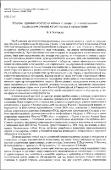Показать сокращенную информацию
Модель церковно-государственных отношений в современном социальном учении католичества и православия
| dc.contributor.author | Борецкая, В. К. | |
| dc.coverage.spatial | Гомель | |
| dc.date.accessioned | 2017-02-16T07:05:12Z | |
| dc.date.available | 2017-02-16T07:05:12Z | |
| dc.date.issued | 2008 | |
| dc.identifier.citation | Борецкая, В. К. Модель церковно-государственных отношений в современном социальном учении католичества и православия / В. К. Борецкая // Известия Гомельского государственного университета имени Ф. Скорины. - 2008. - № 3 (48). - С. 83 - 90. | ru_RU |
| dc.identifier.uri | https://elib.gstu.by/handle/220612/15074 | |
| dc.description.abstract | The model of the relationships between the church and the government represented in the modern social doctrine of Catholicism and Orthodoxy doesn't correlate directly with the historically assigned models of such relationships, like European, American or Soviet ones. /The modern model of church&government relationships, on one hand, takes account of the whole historical experience of the Christianity, and on the other hand, accentuates attention on the problems of the modern society. Developing the comparative analysis of the concepts of the relationships between the church and the government in social doctrines of Catholicism and Orthodoxy one can assign three common fundamental principles for the both churches: the principle of autonomy and independence of the church and the government in their scopes of activity; the principle of acknowledgement of the freedom of conscience and denomination in personal and social aspects; the principle of cooperation of the church and the government in achievement of the common good. | |
| dc.language.iso | ru | ru_RU |
| dc.publisher | ГГУ им. Ф. Скорины | ru_RU |
| dc.subject | Церковно-государственные отношения | ru_RU |
| dc.title | Модель церковно-государственных отношений в современном социальном учении католичества и православия | ru_RU |
| dc.type | Article | ru_RU |
| dc.identifier.udc | 27-67 | ru_RU |
